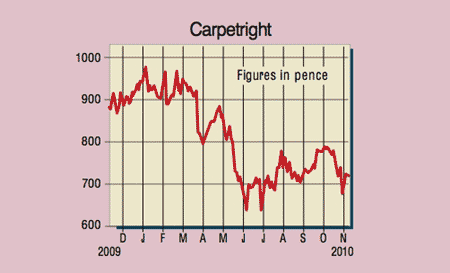
One group that will feel the rougher end of QE2 are those British retailers who import most of their textile goods – clothes, shoes, towels, for example – from Asia.
The fact is, Japanese-style deflation is just not going to happen in Britain. We’re staring at 4%-plus consumer price index (CPI) inflation as emerging markets export the results of overheating in their own economies back to the West. Not only are Chinese wages soaring by 25% a year, but there’s also been a spike in cotton, wool and man-made fibres due to poor harvests and the soaring oil price. By weakening the dollar, the Fed’s printing spree is going to make this situation even worse.
That’s bad news for British importers, who will have to attempt to sell their more expensive goods to consumers, just when disposable incomes are shrinking. So far, because of the weak economic backdrop and the sluggish housing market, it has not been possible to pass these spiralling input costs on to the consumer.
But last week fashion chain Next nudged its head above the parapet and said that the price of its goods may have to rise by as much as 8% in the first part of 2011. The trouble is, if price rises didn’t stick in 2010, why will they do so in 2011, given the harder conditions ahead?
To my mind, this move will simply cause demand destruction, with customers simply not buying the goods, and declining margins.
So what does this all mean for Carpetright? The company is Britain’s largest floor-coverings group, with around a 30% share of the market. Its 702 outlets sell carpets, vinyls, laminates and beds from 584 stores in Great Britain and another 118 in Benelux (Belgium, the Netherlands and Luxembourg).
Turkey of the week: Carpetright (LSE: CPR), rated a SELL by Singer Capital
With such a bleak outlook, I believe its prospects are poor. So it’s strange that its shares have in fact held up amazingly well. One reason is that they have been artificially boosted by takeover rumours surrounding Lord Harris, the firm’s CEO, founder and largest shareholder.
In 2007 he tabled a £12.50-a-share bid for the group, but was forced to withdraw after the credit crunch undermined his financial backers.
A deal could still materialise. Yet any transaction seems remote, given that there is next to no chance of a strong recovery materialising to boost performance. Worse still, the company is facing falling sales (during the first half, like-for-like sales fell 5.8% in Britain and 2.4% in Benelux) and escalating costs, so earnings are set to fall. For a shop-keeper like Carpetright with a high operational gearing, this could be disastrous.
The City expects turnover and earnings per share to come in at £512m and 30.5p respectively for the year ending April 2011. A year later, that’s expected to rise to £531m and 36.9p. As a result, the stock trades on forward p/e ratios of 23.5 and 19.5, which looks far too expensive.
Instead, I would rate the firm on a through-cycle earnings before interest, tax and amortisation (EBITA) multiple of eight, which adjusting for the net debt of £71m, delivers an intrinsic worth of around 490p a share.
In short, with the property market still moribund and households set to pull back their spending on big-ticket discretionary items, Carpetright’s stock could soon be in tatters. Interims are out on 14 December.
Recommendation: SELL at 721p (market cap £484m)